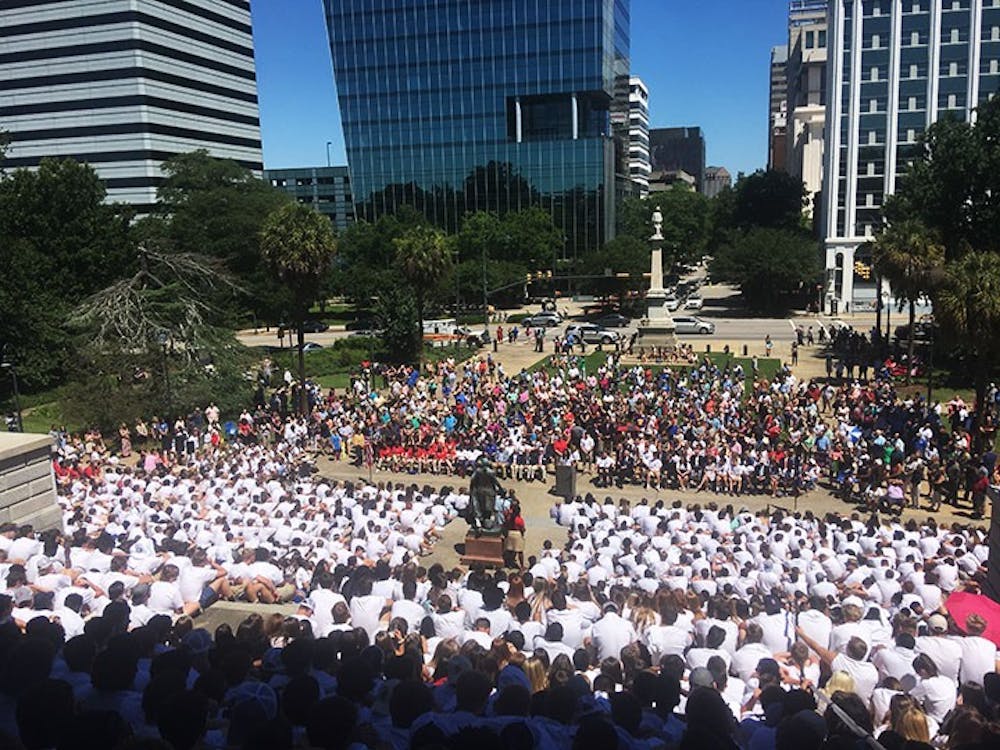Earlier this year, a documentary about a civics engagement program in Texas premiered on Apple TV. "Boys State," the name of both the documentary and the program it follows, discussed many of the characteristics and social commentaries that I related to during my experience at Boys State.
Boys State is a weeklong experience that every state holds and to which rising high school seniors can apply. I applied, attended and, at the end of my week, realized I had experienced something that can't be explained.
I remember walking into the meeting room of my "city," a division group within the program, for the first time and looking at all of the other boys who were accepted in my group. The young men were from different places and backgrounds, now all clad in the same '70s-era white T-shirts with "PALMETTO BOYS STATE" — the South Carolina-specific edition of the event — printed in thick letters on the front. These shirts have remained the same for the past 40 years.
The meals were quick. We marched in two lines; chanted constantly; carried around a painted banner; got very little sleep; competed; voted; worked out; learned about the government while trying to stay awake; went to assemblies of thousands of screaming, sweaty teenage boys as smoke machines hissed and music blared; and even shed a few tears.
By the end of the week, the entire group was intricately bonded by shared experience. By personal choice or not, I made a small group of friends who also happened not to fit the unintentional Boys State prime candidate criteria: Young men like me who had similar, passive attitudes toward not being confident, athletic, charming or relatively normal.
Objectively, one can't say that Boys State isn't diverse or inclusive. It was one of the first programs to historically integrate, and it now provides an unbelievably generous opportunity to all who are chosen from the interview process, which is based not just on academics or the interview, but also on the exemplification of the qualities of a moral and upstanding citizen of the state.
Harrison McGuire, a second-year student at USC, won the “Spirit of Boys State” award for devoting his entire week as a junior counselor to helping a severely disabled boy with cerebral palsy win a high position in a Boys State election.
However, with its sponsorship by the American Legion, the program's extreme patriotism and overt ties to a militaristic identity didn’t help to spread the surreal ambiance of Boys State. Many nuances combined to build an environment of community and learning with a hint of sweaty, overbearing masculinity and an indirect feeling of hyperconservative beliefs and subliminal nationalism.
Subtle, darker tendencies crept into the program, too, with a focused salivation towards the members in Girls State, who we met at the end of the week. This testosterone-fueled interest presented itself through frequent, questionable chants and objectifying comments.
Boys State itself never preached anything unjust, but it also never preached against many of its ingrained aspects that we have acknowledged in our modern world as problems.
It was never Boys State as a program that created these sentiments. Rather, it was the mentalities and actions of the people, the unintentional programming and the inadvertent demographics of the population that built the Boys State microcosm. It often felt like I was being inducted into a “good ol' boys” club of traditional, pro-military-leaning young men.
By the end of the week, Boys State gave back to me what I put into it. I didn’t give many speeches or win any competitions, but I had fun with good people and made friends that opened my eyes to different perspectives.
On the last night, my "city" privately shared an unforgettable moment of catharsis and tears about our lives and struggles. Under a tree off the side of an Anderson University parking lot, I realized that, even though I didn't share the same backgrounds or ideas as many of the guys around me, through hearing stories of their struggles and coexisting so closely, each boy's life and past became just as human and understandable as anyone's. After hearing their stories, I saw that no matter how insular a guy might be, no one was completely irredeemable.
Boys State really became something that I had to experience in order to understand. I probably didn’t have the normal experience that Boys State sets out to give people, but I certainly had an experience that opened my eyes to a lot of the problems with today's world. At the end, I recognized the inherent value of everyone having his own story to tell, no matter how toxic.

